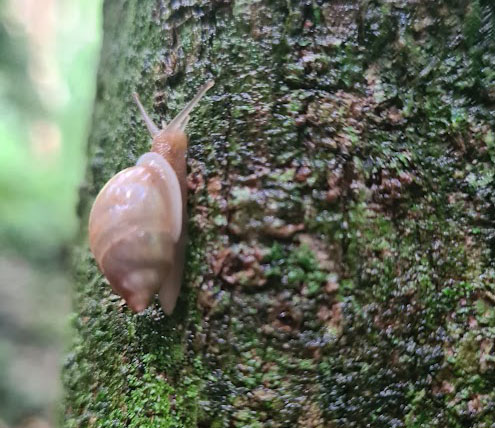Summary of Restoring Snail Populations in Tahiti:
The Detroit Zoo has released 2,413 Partula nodosa snails, also known as Polynesian tree snails, into Papahue Valley, Tahiti, in the largest wild release ever for this species. Snails are considered extinct in the wild and are important for maintaining tropical forest health and Polynesian culture. The Detroit Zoo contributed 1,449 snails to the release, marking them with UV-reflective paint for tracking. The snails were introduced to combat the invasive African giant land snails, which had destroyed vegetation and disrupted the ecosystem. The Detroit Zoo keeps a dedicated snail room with optimal conditions, including humidity and temperature control, for breeding and tracking their captive population. The captive population is flourishing, and there are plans for more frequent releases. Erica Graber helps organize the project at the Detroit Zoo.
Summary:
– The recent release of 2,413 Partula nodosa snails in Tahiti marks the largest wild release for this extinct-in-the-wild species.
– The Detroit Zoo contributed 1,449 snails to the release, highlighting conservation efforts.
– Partula snails, once driven to near extinction by African giant land snails, play a vital role in the tropical forest ecosystem and Polynesian culture.
– The Detroit Zoo maintains optimal conditions for its captive snail population, flourishing and contributing to reintroducing efforts.
– Collaboration among various zoos and organizations offers hope for the future of Partula snails.
Restoring Snail Populations in Tahiti: A Record-Breaking Release!
In a remarkable effort to save the Partula nodosa snails, also known as Polynesian tree snails, a record-breaking release of 2,413 snails took place on April 15 in Papahue Valley, Tahiti. This release, organized by the Detroit Zoo and its dedicated team, marks the largest wild release ever for this species, which is considered extinct by the International Union for Conservation of Nature. The Detroit Zoo played a crucial role in this conservation endeavor by contributing 1,449 snails from their collection.
The story of the Partula snails is a tale of resilience and determination. These snails faced near extinction after the introduction of African giant land snails to the islands as a food source for the locals. Unfortunately, the African giant land snails thrived in the island habitat, becoming invasive and wreaking havoc on the delicate ecosystem. To control their population, predatory rosy wolf snails were introduced. However, these wolf snails only preyed on native snail species, including the Partula snails. The Partula snails, with their crucial role in maintaining tropical forest health by consuming decaying plant matter and fungi, are vital to the balance of the forest ecosystem. Additionally, these snails hold cultural importance to the Polynesian people, as their shells were used in ceremonial jewelry and decorations.
The Detroit Zoo recognized the urgency of saving this species and embarked on a mission to restore the Partula snail populations. With a dedicated room devoted to their care, the zoo currently houses a thriving population of 3,595 snails in 41 Kritter Keepers. Each tank has a paper towel as substrate, a feed tray, a cuttlebone, and a fake plant for camouflage and climbing. The snails receive a specially formulated diet consisting of organic nettle powder, ground organic oats, ground trout chow, a powdered calcium supplement, and Teklad snail stress powder. The zookeepers meticulously maintain the temperature between 68 and 72 degrees Fahrenheit and the humidity between 60 and 80 percent. Up to five humidifiers are used in low humidity, and the tanks are misted daily to keep the paper towel moist.
To ensure the success of their captive breeding program, the Detroit Zoo keeps close track of the snail population. Erica Graber, the snail care specialist, rigorously counts and separates the snails based on size every month. The categories include newborns (less than 3 millimeters), juveniles (3-7 millimeters), sub-adults, and adults (more than 8 millimeters). The adults are easily recognizable by the thick white “lip” around the shell opening. Thanks to the optimal conditions provided by the Detroit Zoo, the Partula snails have been able to breed consistently, enabling them to contribute substantially to the recent record-breaking release. This release of 1,500 snails surpasses the zoo’s record of 100 snails in May 2015.
With a flourishing captive population and the commitment of several zoos, including Detroit, St. Louis, Akron, Woodland Park, and Disney’s Animal Kingdom, the future is looking bright for the Partula snails. Plans are already underway for more frequent releases, potentially as soon as September. The collaboration and determination of these organizations offer hope for the continued protection and conservation of this unique species.
In conclusion, the recent record-breaking release of 2,413 Partula nodosa snails in Tahiti brings new hope and optimism for restoring this culturally significant and ecologically vital species. The Detroit Zoo’s active participation in conservation efforts highlights the crucial role of zoos in protecting endangered species. Through their dedicated care and breeding programs, the captive populations of Partula snails continue to thrive and contribute significantly to the reintroduction process. By working together, various zoos and organizations make a tangible difference in preserving the delicate balance of our natural world and safeguarding the rich cultural heritage of these fascinating creatures.

